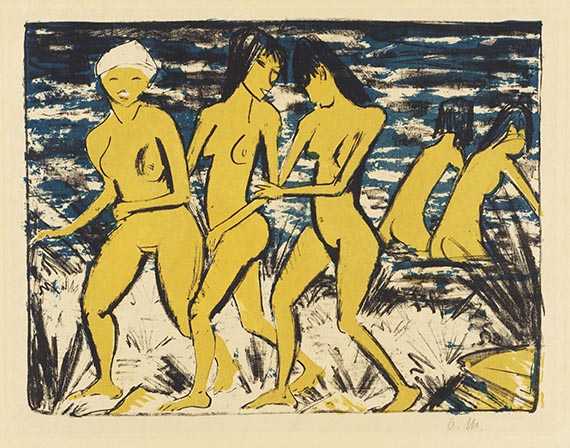Lithograph in colors. Monogrammed. From an edition of 100 unnumbered copies. On faded, slightly hammered wove paper. 33 x 44 cm. Sheet: 41,8 x 52,5 cm.
Published by Kurt Wolff in Hyperion Verlag. [KA] The "Brücke": Expressionism on Paper - The Passion of a German Collector Further works from the collection will be offered in our Evening Sale on Friday, December 6, 2024, and in the simultaneous Online Sale (Auction ends on December 15, 2024).
- One of Otto Mueller's very rare color lithographs. - Outstanding example of Mueller's quest for a harmonious unity of man and nature. - Strong graphic style. - The motif of bathers in the open air is considered one of the main motifs of the “Brücke” artists.
LITERATURE: Florian Karsch, Otto Mueller. Das graphische Gesamtwerk, Berlin 1974, no. 156 c (of c) (m. Abb.). Heinz Spielmann (ed.), Die Maler der Brücke. Sammlung Hermann Gerlinger, Stuttgart 1995, p. 253, SHG no. 362 (illu.). Kunsthaus Lempertz Köln, Kunst des XX. Jahrhunderts. Gemälde, Plastik, Aquarelle, Handzeichnungen, Graphik, June 11, 1963, lot 516, illustrated.
The "Brücke": Expressionism on Paper - The Passion of a German Collector The Hessian collector recollects his first encounter with Expressionist art to this day: it was shortly after the end of World War II that he was struck by Karl Schmidt-Rottluff paintings on a visit to the Frankfurter Kunstkabinett. The gallery was one of the first in Germany to offer art lovers an opportunity to see works by the artists of the "Brücke" group again, as they had been ostracized as "degenerate" by the Nazis. One of the main reasons behind Hanna Bekker von Rath's decision to open the place on Börsenplatz in Frankfurt in 1947 was to provide a forum for these artists after the dark years of Nazi rule and to reintroduce them to the public. “These works blew me away” is how the collector recalls his initial reaction to the exhibits. He liked Schmidt-Rottluff's rugged, woodcut-like style and subsequently also developed a liking for the other members of the “Brücke”, whose style was so different from what had previously been considered “beautiful”. Together with his wife - who was particularly interested in the works of Otto Mueller and Emil Nolde - he visited many more exhibitions at the Frankfurt Kunstkabinett and other galleries. Nevertheless, it was about more than just admiring them. In 1962, the couple bought their first Expressionist work at auction in Stuttgart - from Roman Norbert Ketterer, the uncle of the current owner of Ketterer Kunst: Ernst Ludwig Kirchner's woodcut "Drei Akte im Wald" from 1933 marked the beginning of the couple's extensive collection of "Brücke" prints. He never had a specific system, says the collector. However, he avoided acquiring pieces that “many others had as well”. He was particularly interested in works produced in small numbers, pieces with a unique feature such as an additional coat of paint, or works that the artist used as trial proofs. But first and foremost, says the collector, “I made my purchases based on my taste”. Further works from the collection will be offered in our Evening Sale on Friday, December 6, 2024, and in the simultaneous Online Sale (Auction ends on December 15, 2024)



